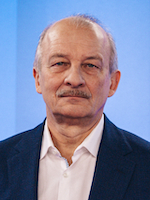 | Sergey Aleksashenko, in the 1990s, was in public service in Russia as a senior expert in the Commission on Economic Reform in the Government of the USSR, deputy minister of finance of Russia in charge of budgetary planning and tax policy, and first deputy governor of the Central Bank of Russia in charge of monetary and foreign exchange policy and settlement system. Subsequently, he spent ten years in private business as a managing director of Interros Holding, then President of the investment boutique Antanta Capital, and in 2006-2008 acted as the President and CEO of Merrill Lynch Russia. From 2008 – to 2014, Aleksashenko was a director of macroeconomic research at the Higher School of Economics. In 2014 he relocated to Washington, DC, where until September 2019, was a nonresident senior fellow at the Brookings Institution. Currently, he is an independent consultant. In 2015-2020 he advised on different aspects of economic transformation to the National Bank, Ministry of Finance, and the Government of Ukraine. He is a Member of the Anti-War Committee of Russia. |
 | Margarita Balmaceda is a Professor of Diplomacy and International Relations, having joined the Seton Hall University School of Diplomacy and International Relations in 1999, where she received tenure in 2003 and was promoted to Professor in 2010. She teaches courses on the Politics of Ethnic and Cultural Diversity, on Post-Soviet and East European Politics and Foreign Policies, as well on Master’s Research Project. Currently she is an Associate of the Davis Center for Russian and Eurasian Studies and of the Ukrainian Research Institute at Harvard University. A specialist on the comparative energy politics of the post-Soviet states, since 2000 she has been following the complex web of interconnections that accompany the energy relationship between Russian oil and gas producers, post-Soviet transit states, and European consumers. From 2010-2011, with the support of the European Union, she conducted a project on “Getting energy from Russia to Europe: Domestic political conditions in the energy-poor transit states of and risks to energy transit,” an area of research she has developed through, among many publications, her books, The Ukrainian-Russian-Central European Security Triangle (Editor, CEU Press, 2000), Energy Dependency, Politics and Corruption in the Former Soviet Union (Routledge 2008) and (under review) The Politics of Energy Dependency: Ukraine, Belarus and Lithuania Between Domestic Oligarchs and Russian Pressure, 1992-2010 and Turning Politics into Economics, Dependency into Power: Belarus, Russia and Energy under Lukashenko. Balmaceda received a B.A. from Johns Hopkins University and an M.A. and Ph.D. in Politics from Princeton University. |
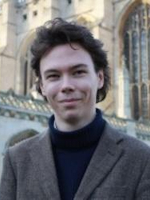 | Hugo Bromley is a historian of English manufacturing and British political economy and geopolitics, focusing on the early eighteenth century. His recently submitted PhD, completed at Cambridge, looked at how textile manufacturers and their employees shaped the formation of Britain after 1688, and the role of the British state in the global economy immediately before the Industrial Revolution. At the Centre for Geopolitics, he will coordinate the forthcoming project on the applied history of the UK Union, as well as continuing his own research. He is also a affiliated postdoctoral research associate at Robinson College. Bromley previously worked for the Centre as a Research Assistant on the Baltic Geopolitics Programme, which continues to support. He also hosted a short podcast series on the Geopolitics of Finance, which is available online at On Geopolitics. He completed his undergraduate studies at the LSE and his MPhil at Cambridge. Away from academia, he has worked as a researcher at the International Financial Law Review and as a reporter at IFLR Practice Insight. |
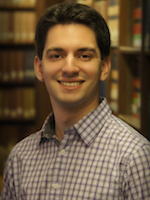 | Arik Burakovsky is Assistant Director of the Russia and Eurasia Program at The Fletcher School, which he helped establish in 2018. His research interests include Russian foreign policy and political economy, soft power, public diplomacy, and international relations forecasting. Before completing his M.A. in Law and Diplomacy at The Fletcher School, Arik interned in the Public Affairs Section at the U.S. Embassy Moscow and studied the Polish language and culture as a Boren Fellow at the University of Warsaw in Poland. He also served as a Fulbright English Teaching Assistant in Omsk, Russia and twice as Resident Director of the ROTC Project GO intensive summer Russian language program in Narva, Estonia. His work has been published by The Conversation, TIME, The National Interest, the Chicago Council on Global Affairs, and elsewhere. Arik received his B.A. in Political Science and International Relations from the University of California, San Diego. |
 | Irina Busygina is a Research Fellow at Davis Center for Russian and Eurasian Studies at Harvard University. She previously worked as Professor of Comparative Politics at the Department of Political Science and International Relations (Higher School of Economics at Saint Petersburg, Russia) and headed the Center for Comparative Governance Studies. Her research interests include comparative federalism and decentralization, Russian domestic and foreign policy, Russia-EU relations. Her latest publications include “Center-regional relations in Russia”. In: Routledge Handbook of Russian Politics and Society. Ed. by Graeme Gill. UK: Routledge, 2023; “Ready to Protest? Explaining Protest Potential in Russian Regional Capitals.” Regional and Federal Studies published online January 2023; “Pandemic Decentralization: COVID-19 and Principal–Agent Relations in Russia.” Problems of Post-Communism, Published online: 14 Sep 2022. Her last book (coauthored by Mikhail Filippov) is “Non-Democratic Federalism and Decentralization in Post-Soviet States” (UK: Routledge 2024). |
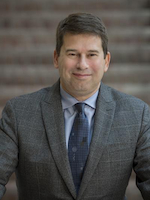 | Daniel W. Drezner is Distinguished Professor of International Politics, a nonresident senior fellow at the Chicago Council on Global Affairs, and the co-director of Fletcher’s Russia and Eurasia Program. Prior to joining The Fletcher School of Law and Diplomacy, he taught at the University of Chicago and the University of Colorado at Boulder. He has previously held positions with Civic Education Project, the RAND Corporation and the U.S. Department of the Treasury, and received fellowships from the German Marshall Fund of the United States, Council on Foreign Relations, and Harvard University. Drezner has written seven books, including All Politics is Global and Theories of International Politics and Zombies, and edited three others, including The Uses and Abuses of Weaponized Interdependence. He has published articles in numerous scholarly journals as well as in the New York Times, Wall Street Journal, Politico, and Foreign Affairs, and has been a regular contributor to Foreign Policy and the Washington Post. He received his B.A. in political economy from Williams College and an M.A. in economics and PhD in political science from Stanford University. |
 | Alena Epifanova is a research fellow in the Center for Order and Governance in Eastern Europe, Russia, and Central Asia at the German Council on Foreign Relations (DGAP) in Berlin. She leads research on Russia’s “sovereign internet” and technology policy, and the threats digital authoritarianism poses to democracy and the global order. Her research also focuses on Russia’s domestic politics and German–Russian relations. Before joining DGAP in 2018, Alena worked at the Centre International de formation européenne (CIFE) and conducted freelance academic research for the journal OSTEUROPA and the Institute for European Politics (IEP). Epifanova holds a master’s degree in political science from the Free University of Berlin. She received an International Parliamentary Scholarship from the German Bundestag (IPS) in 2015 and is an alumna of the Friedrich Naumann Foundation. Her research has been cited in media outlets such as Wired, MIT Technology Review, Fortune, The Financial Times and BBC. |
 | Edward Fishman teaches at Columbia University’s School of International and Public Affairs and is a senior research scholar at the Center on Global Energy Policy. He is the author of the forthcoming book Chokepoints: American Power in the Age of Economic Warfare (Portfolio/Penguin, 2025). Previously, he served at the U.S. State Department as a member of the Secretary of State’s Policy Planning Staff, at the Pentagon as an advisor to the Chairman of the Joint Chiefs of Staff, and at the U.S. Treasury Department as special assistant to the Under Secretary for Terrorism and Financial Intelligence. His analysis is regularly featured by outlets such as The New York Times, The Wall Street Journal, The Washington Post, and NPR, and he frequently writes for publications such as Foreign Affairs and Politico. |
 | Eyck Freymann is a Hoover Fellow at the Hoover Institution, Stanford University and a non-resident research fellow at the China Maritime Studies Institute at the U.S. Naval War College. He is the co-author of “On Day One: An Economic Contingency Plan for a Taiwan Crisis,” and One Belt One Road: Chinese Power Meets the World (Harvard University Press, 2021). |
 | Mariya Grinberg is an Assistant Professor of Political Science and member of the Security Studies Program at MIT. Her primary research examines why states trade with their enemies, investigating the product level and temporal variation in wartime commercial policies of states vis-a-vis enemy belligerents. Her broader research interests center on the question of how time and uncertainty shape the strategic decisions of states, focusing on order formation, military planning, and questions of state sovereignty. |
 | Peter Harrell is a nonresident fellow at the Carnegie Endowment for International Peace. He also serves as an attorney advising companies and investors on international legal, regulatory, and geopolitical risks. As a member of Carnegie’s American Statecraft program, Harrell’s research focuses on issues of U.S. domestic economic competitiveness, trade policy, and the use of economic tools in U.S. foreign policy. From January 2021 through 2022, Harrell served at the U.S. White House as senior director for international economics, jointly appointed to the National Security Council and the National Economic Council. In that role, Harrell co-led President Biden’s E.O. 14017 supply chain resilience agenda; worked on the global digital, 5G, and telecommunications strategies; spearheaded negotiations with the European Union on the U.S.-E.U. Data Privacy Framework; served as the White House representative to the CFIUS committee; and worked on U.S. sanctions and export controls towards Russia in response to Russia’s invasion of Ukraine. Immediately prior to joining the White House, Harrell served on the Biden-Harris Transition team from September 2020 to January 2021. |
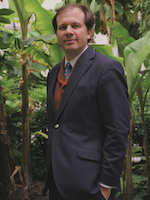 | Maximilian Hess is the founder of Enmetena Advisory, a London-based political risk firm specialising in insurance markets, sovereign debt, and sanctions. Max also serves as a fellow at the Foreign Policy Research Institute and as an associate fellow at the International Institute for Strategic Studies. His first book ‘Economic War: Ukraine and the Global Conflict between Russia and the West’ was published by Hurst and Oxford University Press in 2023 and an updated edition will be released later this year. Max’s next book, provisionally titled ‘Cherub of the Caucasus: A Chronicle of Contemporary Tbilisi,’ is due for release in 2025. |
 | Vladislav Inozemtsev is a Russian economist and political scientist, focusing on global economic issues, development of the knowledge economy in the West and modernization of the Third World nations, with special reference to Russia’s history and current policies. He founded the Center for Post-Industrial Studies in Moscow in 1996 and has been its Director ever since, combining this activity with teaching at Moscow State University and the Higher School of Economics and numerous fellowships held in the US (Johns Hopkins University and CSIS) and Europe (DGAP in Berlin, Institute of Human Sciences in Vienna and Warsaw Institute of Advanced Studies, among many others). Dr. Inozemtsev served as an advisor to the Commission on Modernization of the Russian Economy under President Dmitry Medvedev in 2009-2011, as the chief aide to Mikhail Prokhorov’s presidential bid in 2012, and as a member of Russia’s ‘Open Government’ in 2013-2014. He left Russia after the start of the war with Ukraine in 2014 and lives in Washington. Currently he holds a position of Senior Fellow with the Center for Analysis and Strategies in Europe and is a Special Advisor to Russian Media Studies Project at the Middle East Media Research Institute, a Washington DC-based think tank. Dr. Inozemtsev has authored more than 20 books and is a columnist for the Neue Zürcher Zeitung, NRC Handelsblad, The Independent, Gazeta Wyborcza and La Razon. |
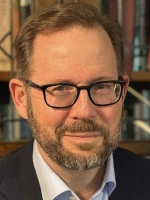 | Craig Kennedy is a historian, energy commentator, and a retired international finance professional. He worked for 20 years advising corporate clients worldwide on capital raising and strategic transactions, first with Morgan Stanley, then with Bank of America Merrill Lynch, where he was a vice chairman. In the early 1990s, he opened the Moscow office of Cambridge Energy Research Associates. Prior to that, he taught at Harvard College. He has spoken widely on Russia, finance, and energy. Craig has been writing a history of Russia’s oil industry since 1860 and how it has affected the emergence of civil society. He has served as chairman of Pushkin House, an independent U.K. cultural foundation, and in other volunteer public service roles. In addition to his historical research, Craig also analyzes the impact of sanctions on the Russian oil and gas industry. He collaborates closely with the International Working Group on Russian Sanctions and publishes some of his analysis on his Substack, “Navigating Russia.” Craig received a B.A., summa cum laude, in Slavic languages and literatures from Harvard College, an M.Lit. in Turkic languages from Oxford University, where he was a Rhodes Scholar, and a Ph.D. in history and Middle Eastern studies from Harvard University, where he was a Fulbright Scholar. His dissertation examined the emergence of 16th century Muscovy as an ascendant Eurasian power. |
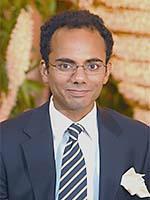 | Sulmaan Khan holds the Denison Chair in International History and Chinese Foreign Relations at the Fletcher School, Tufts University. He is the author of HAUNTED BY CHAOS: CHINA’S GRAND STRATEGY FROM MAO ZEDONG TO XI JINPING (Harvard University Press) and MUSLIM, TRADER, NOMAD, SPY: CHINA’S COLD WAR AND THE PEOPLE OF THE TIBETAN BORDERLANDS (University of North Carolina Press). He has written for Foreign Affairs, Foreign Policy, and The Economist. He has been a participant in NIC seminars and has spoken on China at INDOPACOM. His new book THE STRUGGLE FOR TAIWAN: A HISTORY OF THE UNITED STATES, CHINA, AND THE ISLAND CAUGHT BETWEEN will be published by Basic Books (US) and Allen Lane (UK and Commonwealth) in 2024. He holds a B.A., M.A., and Ph.D. from Yale University |
 | Ivan Kurilla is a Visiting Tallman Scholar in Russian, East European, and Eurasian Studies at Bowdoin College. He has held positions as the Mary L. Cornille Distinguished Professor in the Humanities at Wellesley College and Professor of History and International Relations at the European University at St. Petersburg. Kurilla has also been a Fulbright scholar at Dartmouth College and a visiting scholar at George Washington University. His research interests focus on Russian-U.S. relations and the political use of history in both countries. Kurilla’s recent books include Americans and All the Rest: Origin and Meaning of U.S. Foreign Policy (Alpina, 2024) and Battle for the Past: How Politics Changes History (Alpina, 2022) (both in Russian). His forthcoming book, From Distant Friends to Intimate Enemies: History of Russian-American Relations, coauthored with David S. Foglesong and Victoria I. Zhuravleva, will be published by Cambridge University Press in 2025. Kurilla is a frequent commentator for international media, with op-eds in major outlets like The Washington Post, The National Interest, and Al Jazeera. |
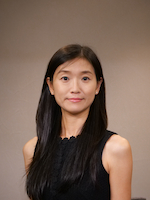 | Zongyuan Zoe Liu is the Maurice R. Greenberg Senior Fellow for China Studies at the Council on Foreign Relations (CFR). Her work focuses on international finance, sovereign wealth funds, industrial policies, and the geoeconomics of energy transition. Her regional expertise is in East Asia and the Middle East. Dr. Liu is the author of Can BRICS De-dollarize the Global Financial System? (Cambridge University Press, February 2022) and Sovereign Funds: How the Communist Party of China Finances its Global Ambitions (Harvard University Press, June 2023). The book Sovereign Funds is the 2024 Winner of the PROSE Award in Business, Finance, and Management. Dr. Liu teaches in the capacity of an Adjunct Assistant Professor at the School of International and Public Affairs (SIPA) of Columbia University. Dr. Liu is a columnist for Foreign Policy. She is also a regular contributor to policy-relevant journals and newspapers, such as Foreign Affairs, The International Economy, Newsweek, and The Washington Post. Her research has been featured in The Economist, Financial Times, The Guardian, New York Times, Reuters, and The Wall Street Journal, among others. Prior to joining CFR, Dr. Liu was an assistant professor at Texas A&M’s Bush School of Government and Public Service in Washington, DC. She joined the Bush School after post-doctoral fellowships at the Columbia-Harvard “China and the World Program” and the Center for International Environment and Resource Policy at the Fletcher School at Tufts University. Dr. Liu received her PhD in international relations from Johns Hopkins University. She is also a Chartered Financial Analyst (CFA) charterholder. Her paper on BRICS Collective De-dollarization Statecraft received the 2021 Best Paper Award from the International Studies Association (West) annual conference. |
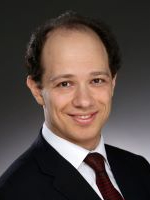 | Alexander Libman is a Professor of Russian and East European Politics at the Freie Universität Berlin. Before that, he worked, among others, at the Ludwig Maximilian University of Munich, German Institute for International and Security Affairs SWP and Frankfurt School of Finance & Management. He holds a PhD in Economics from the University of Mannheim. His research focuses in particular on comparative analysis of authoritarian regimes, Russian authoritarianism and its domestic and international dimensions. His work was published, among others, in the American Political Science Review, British Journal of Political Science, Comparative Political Studies, Comparative Politics, World Politics and Journal of Democracy. His most recent books were published by the Oxford University Press (Authoritarian Regionalism in the World of International Organizations) and the Cambridge University Press (Historical Legacies of Communism). |
 | Pavel Luzin, PhD in international relations (IMEMO, 2012), is a visiting scholar at the Fletcher School of Law and Diplomacy (Tufts University), a senior fellow at the Jamestown Foundation, a non-resident fellow at the Center for European Policy Analysis and non-resident fellow at the Global Academy, the Russia Program at George Washington University. Dr. Luzin is also a contributor to the Foreign Policy Research Institute and to Riddle Russia. He focuses on Russia’s foreign and defense policy, space policy, and global security issues. In 2017–2018, he was a consultant on the issues of armed forces, law enforcement agencies and defense industry for Alexei Navalny’s presidential campaign in Russia. In 2016–2018, he was a consultant on Russia’s domestic politics for “Nations in Transit” project at Freedom House. In 2013–2014, Pavel Luzin was a research fellow at IMEMO. In 2013, he was an assistant to editor-in-chief of the Security Index journal at PIR Center (Russia). Dr. Luzin also was a lecturer and senior lecturer at Perm State University in 2010–2017, senior lecturer at Perm campus of the Higher School of Economics in 2011–2013, and visiting assistant professor there in 2018–2019. |
 | Allen Maggard serves as an analyst with C4ADS’ Conflict Affected States cell, where he specializes in investigating illicit tech procurement networks tied to the Russian defense industry. Prior to joining C4ADS, Allen worked as a contractor with the Fraud Section of the US Department of Justice’s Criminal Division. Allen’s professional background also includes due diligence investigations and research for a non-partisan foreign policy think tank. Allen earned his undergraduate degree at Indiana University Bloomington in Criminal Justice and Slavic Languages and Literatures. He is currently pursuing a masters degree in foreign policy methods and analysis at American University’s School for International Service. |
 | Chris Miller is Professor of International History at The Fletcher School and Co-Director of the Russia and Eurasia Program. He is the author of Chip War: The Fight for the World’s Most Critical Technology (2022), a geopolitical history of the computer chip. He has written three other books, including The Struggle to Save the Soviet Economy: Mikhail Gorbachev and the Collapse of the USSR (2016), Putinomics: Power and Money in Resurgent Russia (2018), and We Shall Be Masters: Russian Pivots to East Asia from Peter the Great to Putin (2021). He has previously served as the Associate Director of the Brady-Johnson Program in Grand Strategy at Yale, a lecturer at the New Economic School in Moscow, a visiting researcher at the Carnegie Moscow Center, a research associate at the Brookings Institution, and as a fellow at the German Marshall Fund’s Transatlantic Academy. He received his Ph.D. and M.A. from Yale University and his B.A. in history from Harvard University. |
 | Tymofiy Mylovanov is the President of the Kyiv School of Economics and holds the position of Associate Professor at the University of Pittsburgh. He served as the Deputy Chairman of the Board of the National Bank of Ukraine from 2016 to 2019, and as the Minister of Economic Development, Trade, and Agriculture of Ukraine from 2019 to 2020. From December 2020 until November 2023, Dr. Mylovanov served as Advisor to the Head of the Presidential Office of Ukraine. From 2021 to 2023, he chaired the Supervisory Board of ‘Ukroboronprom’ and was reappointed as a member in 2024. Dr. Mylovanov earned his Ph.D. in Economics from the University of Wisconsin-Madison in 2004, and has taught at several leading universities, including the Rheinische Friedrich–Wilhelms–Universität Bonn, University of Pennsylvania, Penn State University, and the University of Pittsburgh. He has published academic articles in top-tier journals such as Econometrica, American Economic Review, and the Review of Economic Studies. Dr. Mylovanov co-founded VoxUkraine during the Revolution of Dignity to improve Ukraine’s economic discourse. Forbes Ukraine recognized him as a top economist in 2014 and 2015. Dr. Mylovanov leads Kyiv School of Economics and has transformed it from a graduate program in economics to a fully-fledged university, a top Ukrainian think tank KSE Institute, a prominent charity foundation, and a top-ranked business school. |
 | Mihaela Papa is the Director of Research and a Principal Research Scientist at the MIT Center for International Studies, focusing on BRICS, climate change, and global governance. She has also served as a Senior Fellow at The Fletcher School, where she led the Rising Power Alliances project and taught sustainable development diplomacy. An expert in negotiation strategy and coalition-building, Papa recently published works on BRICS’ policy convergence and BRICS-US relations (BRICS Convergence Index in the European Journal of International Relations, 2023), as well as on de-dollarization and the BRICS common currency. Her publications on climate coalitions and energy access have appeared in Global Environmental Change and Climate Policy. She has had an international career, including roles as a trade economist in the Croatian Foreign Ministry, a postdoctoral fellow at Harvard Law School, a visiting scholar at Fudan University’s Center for BRICS Studies, and the Director of Global Programs at MIT Sloan School of Management. Her insights have been featured in major media outlets such as CNN, Bloomberg, BBC, News24, and the South China Morning Post. Papa holds an MA in Law and Diplomacy and a PhD in International Relations from The Fletcher School. |
 | Elina Ribakova has been a nonresident senior fellow at the Peterson Institute for International Economics since April 2023. She is also a nonresident fellow at Bruegel and a director of the International Affairs Program and vice president for foreign policy at the Kyiv School of Economics. Her research focuses on global markets, economic statecraft, and economic sovereignty. She has been a senior adjunct fellow at the Center for a New American Security (2020–23) and a research fellow at the London School of Economics (2015–17). Ribakova has over 25 years of experience with financial markets and research, holding previous roles with the Institute of International Finance, Deutsche Bank, Amundi (Pioneer) Asset Management, Citigroup, and the International Monetary Fund. Ribakova holds a master of science degree in economics from the University of Warwick (1999), where she was awarded the Shiv Nath prize for outstanding academic performance, and a master of science degree in data science from the University of Virginia (May 2023). |
 | Mikhail Troitskiy is a visiting professor at the Fletcher School of Law and Diplomacy and a visiting scholar at the Davis Center for Russian and Eurasian Studies, Harvard University. In 2023-2024 he was a professor of practice in Russian studies at the University of Wisconsin-Madison. His research on conflicts, security, and international negotiation has been published with WIREs Climate Change, Problems of Postcommunism, Survival, Global Policy, The Bulletin of the Atomic Scientists, and other journals. In 2009-2015, Troitskiy was deputy director and program officer at the Moscow office of the MacArthur Foundation. He taught at the European University in St. Petersburg in 2014-2022, and at MGIMO University in Moscow in 2003-2022. His media comments are available via https://x.com/mikhailtroitski. |
 | Alexandra Vacroux is the Davis Center’s executive director, on leave for the 2024-2025 academic year. Her scholarly work addresses Russian and Eurasian policy issues, including the war in Ukraine. As director of graduate studies for the Davis Center’s MA program in regional studies, she has mentored dozens of Harvard’s best and brightest students and regional experts. She also directs the center’s Scholars Without Borders program. As of July 1, 2024, Alexandra is spending one year on leave, working with the Kyiv School of Economics as its vice president for strategic engagement. In this role, she will be helping this leading Ukrainian educational institution expand its engagement with top faculty, schools, and programs around the world, further strengthening KSE as a platform for nurturing Ukraine’s human capital as the country recovers from Russia’s invasion. Alexandra lived in Moscow from 1992 to 2004. While there she was a consultant for the Russian Privatization Agency, partner and head of sales at the Brunswick Warburg investment bank, and an active member of the board of United Way Moscow. While completing her dissertation on corruption in Russian pharmaceutical markets she was affiliated with the Center for Economic and Financial Research (CEFIR), a Russian think tank associated with the New Economic School. Prior to joining the Davis Center in 2010 she lived in Washington, DC, where she was a scholar at the Kennan Institute, part of the Woodrow Wilson International Center for Scholars. |
 | Sergey Vakulenko is a senior fellow at the Carnegie Russia Eurasia Center. Prior to joining Carnegie, he has spent his career in the international energy industry, working as an economist, project manager, shareholder representative, business developer, portfolio manager, consultant, and head of practice in Shell, ENEL, IHS CERA. Vakulenko worked on projects in Sakhalin, Siberia, Kazakh sector of the Caspian Sea, the North Sea, Gulf of Mexico, Brazil, Japan and other countries. In 2011-2022 he served as the head of strategy, innovations and sustainability in Gazprom Neft, leaving his position in February 2022. Vakulenko has published articles in the Financial Times and Foreign Affairs and is frequently quoted in Bloomberg, Wall Street Journal, Economist and other major publications. He received his BS in Physics and MS in Computer Science from Moscow Institute of Physics and Technology and MA in Law and Diplomacy from the Fletcher School at Tufts University.
|
 | Rosella Cappella Zielinski is an Associate Professor of Political Science at Boston University and non-resident fellow at the Brute Krulak Center for Innovation and Creativity at Marine Corps University. She specializes in the study of the political economy of security with an emphasis on how states mobilize their resources for war and how wartime coalition members organize their economic needs as well as on the battlefield. Her book How States Pay for Wars (Ithaca, NY: Cornell University Press, 2016), is the winner of the 2017 American Political Science Association Robert L. Jervis and Paul W. Schroeder Best Book Award in International History and Politics. Her other works can be found in the Journal of Peace Research, Conflict Management and Peace Science, Security Studies, European Journal of International Relations, Journal of Global Security Studies, as well as Foreign Affairs and War on the Rocks. Her forthcoming book, Wheat at War, explores how the Allies coordinated wheat and shipping during World War I is forthcoming with Oxford University Press. |
 | Rachel Ziemba runs Ziemba Insights, an advisory firm that engages in macroeconomic scenario analysis and policy due diligence for public and private sector clients. She is also Senior Advisor at Horizon Engage and Adjunct Senior Fellow at Energy, Economics and Security program at the Center for a New American Security. She teaches international political economy at New York University’s Center for Global Affairs. She focuses on the role of coercive economic statecraft policies including sanctions and the array of other tools governments use to reshape markets including sovereign investment and industrial policy. Rachel regularly serves as commentator in key media outlets including CNBC, Bloomberg, New York Times, Financial Times, and her research has been cited by a range of international institutions including the International Monetary Fund, World Bank, European Central Bank, as well as many academic institutions. She has served on a range of task forces aimed to generate policy ideas on Middle East policy and economic sanctions. She is the co-author of Scenarios for Risk Management and Global Investment Strategies and Investing in the Modern Age, both with William Ziemba. Rachel holds a bachelor’s degree from the University of Chicago with honors, and a Master of Philosophy degree in international relations with a specialization in international political economy from St. Antony’s College, Oxford University (with distinction). |






























